Nov 1, 2017
Sustainable Solano will be installing two demonstration food forest gardens in Fairfield at a private residence and one public location as part of its Sustainable Backyard program. The program aims to teach gardening techniques based on permaculture design principles (layered planting system that supports life) and wise water practices such as groundwater storage, roofwater catchment, and laundry-to-landscape greywater re-use. The expansion of these garden installation projects is funded by the Solano County Water Agency with the first project scheduled for 11/04, 11/11, and 12/16 at a private residential backyard.
This three-day installation will serve as a free, hands-on educational workshop open to Solano county residents. Attendees will have the opportunity to be a part of building the foundation for this garden by creating contour swales, building berms, planting fruit tree guilds and the installation of a laundry-to-landscape greywater system.
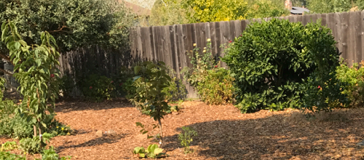
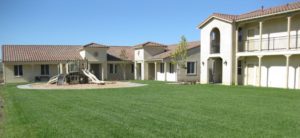
This holiday season, the program will also move forward with the creation of an edible “Christmas” food forest garden at Mission Solano, a transitional housing shelter that provides food, lodging, faith support and job training to over one hundred individuals and families in Solano County. Mission Solano sits on 3.5 acres with much of its land being underdeveloped making it an ideal location for a public demonstration food forest community garden. The demonstration garden will also include swales to capture rainwater, a laundry-to-landscape system, permaculture planting methods and will be open most Saturdays of the year for self-guided tours.
Mission Solano relies heavily on food donations and struggles with providing resident guests high-quality, nutritious food and access to fresh fruits and vegetables. A portion of food is purchased by the organization itself. Both partnering agencies saw an opportunity to not only reduce program food costs through this project, but to also serve the greater community by providing educational opportunities for Fairfield residents to learn about growing their own food, secondary water use and building resilient communities. On Saturday, 12/2 the public is welcome to attend a free greywater system installation workshop to learn how secondary water from your laundry and roof can feed an entire garden.
Most of the installation work and ongoing maintenance of this demo food forest garden will be completed by Mission Solano volunteers. The project is in in alignment with the agencies “job therapy” program that helps resident guests develop skills for future employment and sustainable living. Chief Operating Officer of Mission Solano, Shauna Hughes states, “By teaching our guests how to grow their own food, we can equip them to continue doing so once they establish permanent housing. This will help them overcome the barrier to good nutrition that most low-income residents face.”
Registration is required for all installation workshops for both public and private projects. Visit www.sustainablesolano.org/events to register.
The Sustainable Backyard program will expand to Suisun City next spring and to Vacaville in the fall of 2018. Sustainable Solano will be looking for both private and public lands to install food forests in these cities. Visit www.sustainablesolano.org and www.facebook.com/sustainablesolano for updates and details about this expansion.
About Sustainable Solano
Sustainable Solano a non-profit organization is a non-profit organization dedicated to Nurturing Initiatives for the Good of the Whole. For more information, email info@sustainablesolano.org or visit www.sustainablesolano.org.
Nov 1, 2017
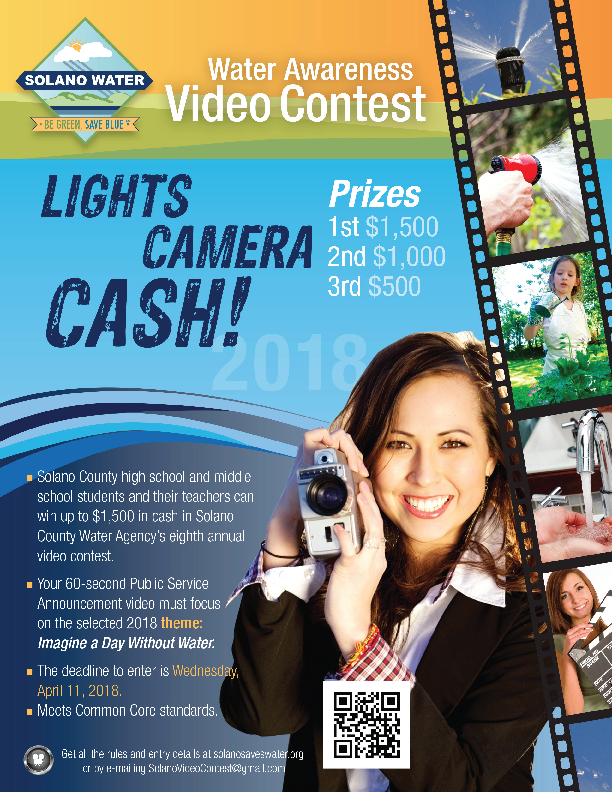
Solano County middle and high school students and their teachers are being asked to “Imagine a Day Without Water”- this year’s theme for the 2018 Water Awareness Video Contest, sponsored by the Solano County Water Agency and local water utilities. Participating students and teachers will have the chance to win up to $1,500 in cash by creating an original 60-second Public Service Announcement video on a variety of water efficiency topics, highlighting actions that can be taken each day to use water more wisely.
Solano County teachers who sponsor multiple students will receive an additional incentive of Amazon gift cards.
The contest is open to middle school and high school students in Solano County. Submissions will judged on entertainment value, originality, videography, style and organization, audio/sound, movie content and accuracy. The deadline to enter is Wednesday, April 11, 2018.
For contest rules and entry forms and tips on using water efficiently, visit the video contest page at www.solanosaveswater.org
Nov 1, 2017
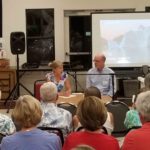
By Stephanie Oeslgigie Jordan, Project Manager, Chef
Can a community decide how it will access food for its members? Is there democratic participation in our food system? What mindsets frame the future of our local food systems? These questions and more kicked off a fascinating lecture-discussion led by Dr. Gail Feenstra and Dr. David Campbell of UC Davis on October 25. Coordinated by Sustainable Solano, the talk was part of an ongoing program hosted by Heritage Presbyterian Church in Benicia, titled “How to Make the World a Better Place,” which features presentations and learning opportunities for people of all ages in Benicia.
Structured as an interview akin to Terry Gross’ “Fresh Air” program on NPR, Drs. Feenstra and Campbell asked provocative questions to each other, to get at the heart of issues surrounding local food systems. The idea of “Local Food” has grown exponentially in the last couple of decades. Dr. Campbell pointed out that in 1997, he and his research team could find only 100 articles on local food, and in 2011 there were over 2000 articles! (In fact, the USDA LFPP grant that Sustainable Solano was awarded didn’t exist 10 years ago.) So, what is all the fuss about? Communities are becoming increasingly interested in how food will be produced, distributed and sold. Over the years, competitive grants programs began to pop up (i.e. Placer Grown, Solano Grown) along with other programs that help communities start businesses and projects that assist local farmers/growers.
When running a food project, Dr. Feenstra had 3 important tips for success (she called them the “3 Ps”): 1) Partnerships are key, and the more diverse your partnerships, the better; 2) Public Participation is necessary for a solid community base and the development of leaders; and 3) maintaining high Principles & Values will help projects achieve social and environmental justice.
Sounds easy, right? Well….there are some challenges according to Dr. Campbell, when asked about planning future food systems. There are 3 different frames of mind out there, each with a different focus. The first is driven by the question, “How are we going to feed 9 billion people?” This perspective is driven by the idea that we need “more”, and incorporates the latest farming technology to increase volume and production. The second group has an environmental focus, driven by climate change. A local example includes the fact that crops are changing location in California, due to increased heat, drought, and changing weather patterns. (We might add that sustainable vs. unsustainable farming methods would affect this problem as well.) The third group is focused on social justice, asking “Why doesn’t everyone have access to healthy food?” and “Who is really running the elements of our food system?”
Not surprisingly, the solution lies in the need for these 3 frames to work together, instead of compete for attention. But how? Dr. Campbell suggests that local communities have advantages of doing work that integrates these elements. Referencing Daniel Kemmis’ book, Community and the Politics of Place, Dr. Campbell theorizes that it is this common love of place that can serve as a foundation to bring people together and allow communities to better tackle issues and develop their own systems. At the same time, communities must have peripheral vision – they must learn to see what’s around them, and develop diverse partnerships with people who can contribute their own unique experiences. If you are too local, you will fight the symptoms, but not the root cause.
And remember those 2000 articles that now exist on local food systems? All that research has illuminated three challenges, which communities must keep in mind: 1) Economic challenges which dance between paying the farmer enough money (so that he/she can continue farming), yet making food affordable for everyone, 2) Social challenges, addressed by numerous studies showing how middle- and upper-class white people are the only ones who can afford healthy food, and 3) Political challenges which highlight the lack of cooperation between one side of the food movement which wants to make changes within, and the other side which wants to “blow up” the system and start something entirely new.
In spite of all these challenges, Dr. Campbell subscribes to what he calls “hopeful realism.” The talk finished with a video of a UC Davis urban agriculture project, where youth work at a community garden in Oakland. Instead of having the director of the program lead a tour through the garden, UC Davis asked the youth to talk about their experiences and knowledge while the camera rolled. At the end of the video, teens and youth were using words such as “love” and “happy” to describe how they felt about their work in the garden. When diverse groups of participants come together and cooperate to solve issues, everyone has the opportunity to benefit in some way.
About the speakers:
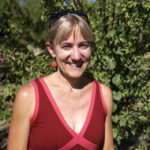 Gail Feenstra is the Deputy Director of the Sustainable Agriculture Research and Education Program (SAREP), a program of the Agricultural Sustainability Institute at UC Davis and the UC Division of Agriculture and Natural Resources (ANR). For Dr. Feenstra’s full biography, click here.
Gail Feenstra is the Deputy Director of the Sustainable Agriculture Research and Education Program (SAREP), a program of the Agricultural Sustainability Institute at UC Davis and the UC Division of Agriculture and Natural Resources (ANR). For Dr. Feenstra’s full biography, click here.
http://asi.ucdavis.edu/people/Feenstra
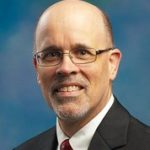 David Campbell, a political scientist, is Associate Dean for social/human sciences in the College of Agricultural and Environmental Sciences at UC Davis. He was appointed Associate Dean in October 2014. For Dr. Campbell’s full biography, click here.
David Campbell, a political scientist, is Associate Dean for social/human sciences in the College of Agricultural and Environmental Sciences at UC Davis. He was appointed Associate Dean in October 2014. For Dr. Campbell’s full biography, click here.
http://www.caes.ucdavis.edu/about/directory/fsd/david-campbell
Nov 1, 2017
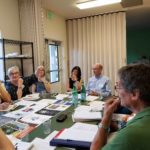
By Stephanie Oesligie Jordan, Project Manager, Chef
On October 25, Sustainable Solano kicked off it’s “Solano Community Food Centers” planning grant – funded by USDA -with an Advisory Board meeting in Benicia, CA.
Attending the meeting were an enthusiastic group representing UC Davis and Solano County, as well as Solano County farmers and community leaders. Board members discussed what aspect of the project each of them could help with, and where their individual expertise could bring goals to fruition. The first phase of the planning grant includes a feasibility study, which will begin with data collection and analysis. As we work through phase 1, we aim to have a clearer picture of Solano County’s local food supply, its existing distribution systems, and an analysis of historical sales data. To this end, Dr. Kristin Kiesel of UC Davis gave a brief presentation on the proposed structure of the feasibility study, and the types of data needed to achieve our goals.
Thanks again to our Advisory Board members! Sustainable Solano is grateful for everyone’s participation and willingness to volunteer their time and talents!
ADVISORY BOARD:
David Campbell, Associate Dean, Social and Human Sciences, UC Davis
Robin Cox, Sr. Health Services Manager, Solano Public Health
Gail Feenstra, Deputy Director SAREP, UC Davis
Simone Hardy, Agricultural Commissioner, Solano County
Mike Ioakimedes, Business Development Manager, Solano County Fairgrounds
Kristin Kiesel, Lecturer PSOE, Agricultural & Resource Economics Dept, UC Davis
Wendy Loomas, Health Services Manager, Solano Public Health
Ben Lyons, Farmer, Lockewood Acres
Denise Lyons, Farmer + Criminalist Supervisor, Solano County DA
Jahniah McGill, Environmental Health Supervisor, Solano County
Greg Morrison, Board Member, Cultivate Community Food Co-Op
Stann Whipple, Treasurer, Board of Directors, Sustainable Solano
Wendy Rash, District Conservationist for the Vacaville Service Center, USDA-NRCS
Sarah Hawkins, Solano County Farmbudsman
For more information on Sustainable Solano’s USDA LFPP grant, click here.
Nov 1, 2017
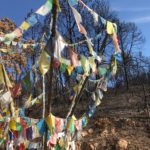
By Nicole Newell, Sustainable Landscaping Manager
It seems like everyone I speak with is facing a fire of some sort in their life. This Sunday I needed a moment of peace in nature to prepare for the week ahead. I took a drive on Highway 12 by myself. There are no words to describe the fire damage to the homes, only emotion. Notes of gratitude for the first responders were all along the road.
I was told about a hidden gem in Sonoma called Quarryhill Botanical Gardens. I decided to visit the gardens located on Highway 12. This sacred space had fire damage surrounding it, yet the gardens survived. In reaction to being spared the
fire destruction, Quarryhill responded in gratitude by opening the gardens to the public free of charge until the end of this year. I was very emotional seeing the fire damage surrounding this 25-acre Asian woodland garden. A mix of emotions; awe at the Fall colors, laughter at the frogs hopping in the pond, tears of serenity at the waterfalls and reverence overlooking the views of the Sonoma Valley.
When I got to the top of the gardens, the prayer flags were surrounded by the fire damage but were not touched by the fire. I spoke with Amy, a young lady working the gift shop. She reminded me that not only did people lose their homes the animals did as well. Quarryhill has become a sanctuary for birds to find food in this area and for people to find tranquility. The prayers survived and this resilient community will rebuild and find peace again.





 Gail Feenstra is the Deputy Director of the Sustainable Agriculture Research and Education Program (SAREP), a program of the Agricultural Sustainability Institute at UC Davis and the UC Division of Agriculture and Natural Resources (ANR). For Dr. Feenstra’s full biography, click here.
Gail Feenstra is the Deputy Director of the Sustainable Agriculture Research and Education Program (SAREP), a program of the Agricultural Sustainability Institute at UC Davis and the UC Division of Agriculture and Natural Resources (ANR). For Dr. Feenstra’s full biography, click here. David Campbell, a political scientist, is Associate Dean for social/human sciences in the College of Agricultural and Environmental Sciences at UC Davis. He was appointed Associate Dean in October 2014. For Dr. Campbell’s full biography, click here.
David Campbell, a political scientist, is Associate Dean for social/human sciences in the College of Agricultural and Environmental Sciences at UC Davis. He was appointed Associate Dean in October 2014. For Dr. Campbell’s full biography, click here.

